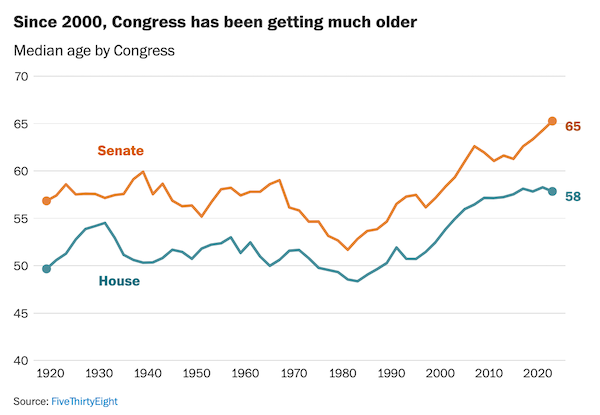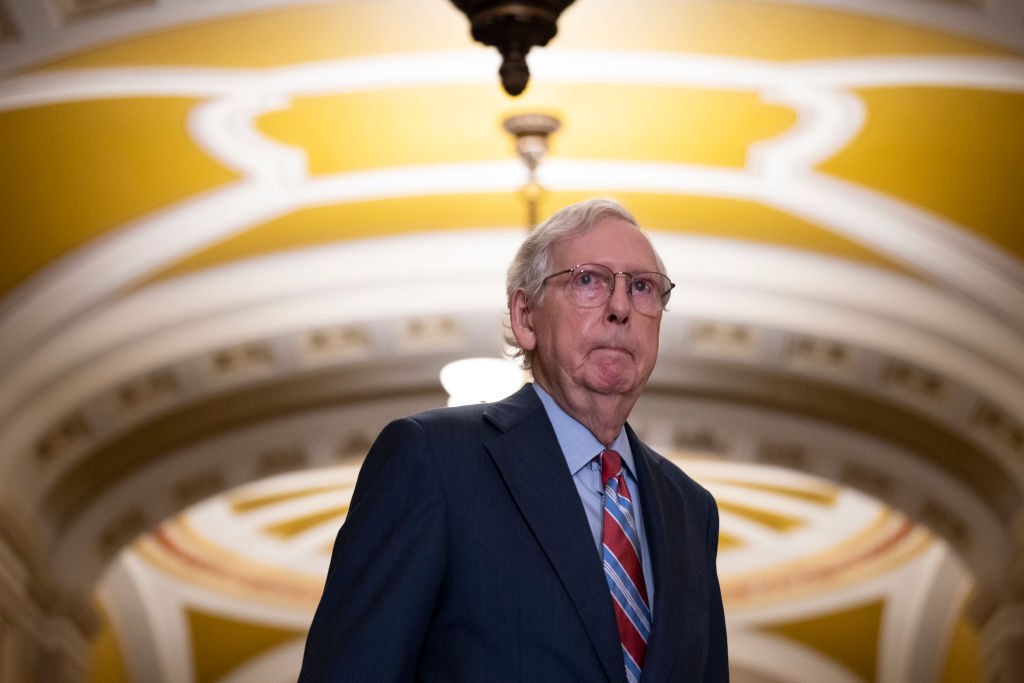There are two ways to read Americans’ minds moment to moment. One is to develop psychic abilities. For the rest of us, there’s Google Trends.
That site reveals that on Thursday Americans were thinking about exactly what you’d expect them to be thinking about. The Women’s World Cup. The most amazing baseball player to ever don a uniform.
And Dianne Feinstein.
There are precious few reasons why a 90-year-old U.S. senator might suddenly occupy a prominent place in the public imagination, none of them happy. Fortunately, Feinstein is alive. Unfortunately, “alive and well” would be a stretch:
It would be nice if we could chalk that up to one bad moment, the sort to which any 90-year-old is occasionally entitled. We cannot. As has become increasingly and grimly clear, the bad moments for Dianne Feinstein appear to outnumber the good ones nowadays.
The word “gerontocracy” was also hot on Google Trends this week, The Intercept pointed out. But it wasn’t Feinstein’s confusion that sent that term skyrocketing. It was something even scarier, physically and politically.
McConnell returned to the podium after a few minutes’ absence and took questions from reporters to prove that whatever had just happened had passed. When Joe Biden called to wish him well, Mitch joked with him about having been “sandbagged,” a reference to one of the president’s own recent senior moments. Everything was fine, it seemed—emphasis on “seemed.”
Senate Republicans whispered to reporters afterward that the minority leader isn’t the man he was before a concussion caused by a nasty fall knocked him out of commission earlier this year. One senator “who considers [himself] a McConnell ally,” in NBC’s phrasing, told the network that his decline is apparent behind the scenes.
“I kind of do” think he should step down, said the senator, who added that the “murmurings” about his future are inevitable. “I’d hate to see it forced on him. You can do these things with dignity, or it becomes less dignified. And I hope he does it in a dignified way—for his own legacy and reputation.”
The senator said they have noticed that McConnell doesn’t speak or answer questions from members as often as he used to in their weekly GOP closed-door lunches, with two of his top lieutenants—Minority Whip John Thune, R-S.D., and Conference Chair John Barrasso, R-Wyo.—stepping in more often.
“People think that he’s not hearing well,” the senator said. “I think that he is just not processing.”
Another senator observed that McConnell is “definitely slower with his gait” lately; the New York Times claims that he’s taken to using a wheelchair at the airport. The Times also reports that some of his colleagues in the Senate were surprised to see him leave debt-ceiling negotiations to Chuck Schumer and Kevin McCarthy instead of taking a more proactive role. That had looked to be a strategic decision aimed at not alienating House Republicans. After this week’s episode, one wonders if the Senate minority leader simply wasn’t equal to the task.
For a traditional conservative, watching Mitch McConnell short-circuit on camera in real time felt vaguely like driving across a suspension bridge and seeing the cables on either side of you start to snap. No politician is indispensable, but if you’re unenthused about the current direction of the GOP, the thought of where it might go once its most formidable institutional pillar crumbles is a dark one.
One cheer for gerontocracy, then?
Public anxiety about McConnell and Feinstein isn’t happening in a vacuum. There’s an elephant in the room, of course, as Americans are reminded almost daily.
Biden’s likely opponent next fall is just a few years younger than he is. And given Donald Trump’s hold on the Republican Party, it’s possible Sleepy Joe won’t be the last octogenarian nominated for president this decade.
The two party leaders embody the two types of elderly incompetence. Biden is an obvious case of having “lost a step”—or several steps, if we’re honest. McConnell has also recently lost one. Dianne Feinstein seems to have lost a marathon’s worth. The other type of incompetence is what we might delicately call “eccentricity,” when a senior’s mental energy remains high but their personality begins to, ahem, intensify. That would be Trump, or Rudy Giuliani. Or any political barnacle over the age of 70 whom one might find taking selfies at Mar-a-Lago.
Senility and insanity, two suboptimal traits in national leadership. We are right to disdain gerontocracy.
We’re right to disdain it for another reason: Gerontocracy breeds secrecy and secrecy breeds distrust. And America already has a worrisome and deepening problem with its people not trusting its institutions.
Not until this week did we learn that the fall that knocked Mitch McConnell out of the Senate for many weeks wasn’t the only spill he’s taken this year. Two weeks ago he face-planted while getting off a plane in Washington. Before that, during a visit in February to Helsinki to meet Finland’s president, he tripped while exiting a car. As for Dianne Feinstein, the truth about why she was absent from the chamber for months turned out to be more complicated than we knew: Her case of shingles afflicted her with encephalitis in March and later caused her to develop Ramsay Hunt syndrome, which involves “vision and balance impairments.” The public wasn’t informed of that until May.
And Donald Trump? He claims he has nothing to hide. (Doesn’t he always.) But after his private goons barged into his doctor’s office and confiscated his medical records in February 2017, there’s room for a sliver of doubt.
Political leaders are naturally averse to showing physical weakness, not wanting to trigger a succession crisis that might cost them power, but the lengths to which a gerontocracy will go to keep propping them up can be morally repellent. Despite obviously being unfit for duty, Feinstein was forced to return to the Senate by the fact that Republicans wouldn’t allow Chuck Schumer to replace her on the Judiciary Committee. Without Feinstein’s vote Democrats couldn’t move judicial nominees, so they concluded that their only option was the Weekend at Dianne’s spectacle seen in the clip up above.
McConnell and Feinstein are old even by the exalted standards of Congress, but American government will still be very much a gerontocracy after they’ve retired. Via the Washington Post:

Americans born between 1928 and 1964 (the “silent” and “baby boomer” generations) make up slightly more than a quarter of the population but slightly more than half of the federal legislature. That’s not altogether bad: One reason Congress is much older than it was decades ago is because Americans now live much longer than they did decades ago. Advanced medicine has intervened to prevent Mother Nature from reliably resupplying the government with fresh faces.
Not altogether bad, as I say—but not altogether good either. Fresh faces bring fresh thinking, and America desperately needs fresh thinking in politics. Right?
Sure. In theory. Until you remember what sort of not-actually-fresh “fresh thinking” the Trumpist GOP is enamored with nowadays.
Mitch McConnell is the longest-serving Senate leader in U.S. history. He took his seat in the chamber a few weeks before Ronald Reagan was sworn in for his second term and has run the GOP caucus since before Barack Obama became president. Right-wing populists have despised him as the consummate go-along-to-get-along Washington establishmentarian since the dawn of the Tea Party era. Democrats have despised him for much longer, and with remarkable intensity since he blocked Obama’s attempt to fill Antonin Scalia’s vacancy on the Supreme Court.
Everyone hates Mitch, yet no one has laid a glove on him electorally for decades apart from a scare in the Democratic wave year of 2008. Despite both the left and the far right perpetually gunning for him, he’s managed to win his last two primaries with 60 percent of the vote or better and his last two general elections with 56 percent or so. Since 2017 he’s defied Donald Trump on ending the filibuster, by blaming him for January 6, and by repeatedly brokering numerous bipartisan legislative deals with the Biden White House. Apart from a bunch of whining about it on Steve Bannon’s podcast, he’s paid no price for any of it.
Having made a mortal enemy of the right’s cult leader, his leadership over an outfit as powerful as the Senate Republican caucus nonetheless remains unchallenged in any serious way. I can’t think of another figure in the party who’s managed that trick.
I don’t mean to lionize him. His failure to convict and disqualify Trump at his second impeachment trial was an act of moral and civic cowardice he’ll never live down. The GOP will spend years paying for it, as it should. But the fact remains: He’s the Senate’s foremost institutionalist, the most influential Reagan Republican in the country by a longshot, and a politician sufficiently shrewd and ruthless to have built an electoral fortress even MAGA populists haven’t managed to breach. (So far.) If you hate what the GOP has become and is yet becoming, the fact that McConnell is still around to keep Congress’ most feral populists in check is a constant relief.
He won’t be around much longer, one way or another.
His three likeliest successors as leader—the “three Johns,” Thune, Cornyn, and Barrasso—are all traditional conservatives who entered the Senate long before Trump entered politics, which is also a relief. Less reassuring is that there’s no good reason to think any of them would be as politically resilient as McConnell if they became minority leader and landed in MAGA’s crosshairs. Trump already has it in for Thune, remember, although he didn’t put much energy into defeating the senator in his reelection bid last year. Cornyn can’t show up to a convention of Texas Republicans without being roundly booed. And Barrasso represents Wyoming, where a very hard lesson was taught recently about what happens to those who cross Donald Trump.
None of them enjoys the respect McConnell does as an operator or fundraiser. None has developed as many relationships within the party as McConnell has, having joined the Senate much later than he did. None, obviously, is entrenched in leadership the way McConnell is. And so none will inspire the same degree of fear in the Trumpist wing of the Senate Republican caucus, which makes the future of compromise in the chamber … unpredictable. And the White House knows it. It wasn’t just compassion that led Joe Biden to nervously inquire about McConnell’s health this week.
If Donald Trump is reelected president in 2024 and demands that the new GOP majority in the Senate immediately end the filibuster so that he can move his MAGA agenda, will Majority Leader John Thune have the nerve to stare him down? That’s one question we’ll need to confront if and when Mitch retires.
Another, relatedly: How many aging Republican holdovers from the pre-Trump era will also choose to depart the Senate in the next year or two, expecting that the possible return of Trump coupled with the end of McConnell’s leadership will make the business of government intolerable? Mitt Romney is up for reelection, I’ll remind you. So is Barrasso. Should they decide to step down, what sort of unsavory characters will prevail in their state’s Republican primaries and end up succeeding them in the Senate?
Out of curiosity, I looked up who the youngest members of Congress are. Of the eight youngest senators, it turns out six are Republicans. Two, Josh Hawley and J.D. Vance, are the most ardent nationalist ideologues in the caucus while Markwayne Mullin, Eric Schmitt, and Tom Cotton are each exceedingly MAGA-friendly. In the House, the youngest cohort includes populist bombthrowers like Lauren Boebert, Anna Paulina Luna, and, uh, George Santos. Max Miller, all of 34 years old, has gone from being a crony in the Trump White House given to calling his then-boss the greatest president ever to representing Ohio’s 7th District. Elise Stefanik, arguably the grandest sellout to Trumpism in the entire party, is already a high-ranking member of leadership and won’t turn 40 until next year.
Santos and hopefully Boebert will be out of a job by 2025 but there’s every reason to think the rest will be haunting the Capitol for years. This is what the new generation of Republicans looks like. This is who the McConnells of the Senate will give way to.
And in a few years, even the Hawleys and Vances might look like responsible actors relative to the current Republican farm team.
Yesterday I noted Ron DeSantis’ misfortune in having briefly hired and then fired 25-year-old Nate Hochman, a young writer superficially mainstream enough to have written for National Review (and interned at The Dispatch) who somehow keeps stumbling into controversies that make him sound alt-right. He isn’t the only DeSantis hanger-on with that problem: Pro-Ron “influencer” Pedro Gonzalez recently had some of his old private texts leaked that included bon mots like “not every Jew is problematic, but the sad fact is that most are.” Fellow DeSantis “influencers” responded by dutifully rallying to his side, of course. Loyalty uber alles.
“There’s a lot of young Republican staffers working in the ‘New Right’ ecosystem that will be headaches for Republicans in the next few years just like Hochman is now for DeSantis,” one savvy campaign finance expert tweeted this week. “Brains poisoned by the toxic alt-right online scene. He’s a harbinger of what’s to come.” Indeed he is. If you have any hope left for the next generation of the American right, I encourage you to read up on the New York Young Republican Club—including and especially their own words, which cannot be topped for vivid insight into their “thinking.”
This is what’s coming. Given the squalid state of presidential primary polls and of right-wing media, there’s zero cause to believe things will get better in Republican politics rather than worse. “We need Mitch to live forever” is not, alas, a serious plan for political improvement.
Ross Douthat once answered progressive grumbling about social conservatives by warning them: If you don’t like the Christian right, wait until you see the post-Christian right. That sentiment works equally well for the sooner-or-later-ish departure of Mitch McConnell. If you didn’t like McConnell’s GOP, wait until you see the post-McConnell GOP.
One cheer for gerontocracy, then. On that note, have a happy weekend.









Please note that we at The Dispatch hold ourselves, our work, and our commenters to a higher standard than other places on the internet. We welcome comments that foster genuine debate or discussion—including comments critical of us or our work—but responses that include ad hominem attacks on fellow Dispatch members or are intended to stoke fear and anger may be moderated.
You are currently using a limited time guest pass and do not have access to commenting. Consider subscribing to join the conversation.
With your membership, you only have the ability to comment on The Morning Dispatch articles. Consider upgrading to join the conversation everywhere.